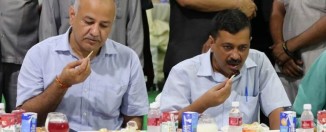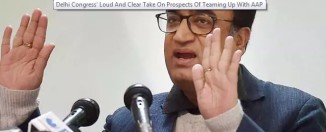Is the AAP Crumbling? Again?
Despite its incredible win in the Delhi polls, the party’s implosion started a while ago. A look at how all the infighting and backbiting has been steadily coming to a boil.
The Aam Aadmi Party (AAP), the political offshoot of Anna Hazare’s hunger strike against corruption in 2011, declared itself the crusaders of a new political space. A space that promised transparency, a decentralized power structure, a promise to fight for women’s equality and against corruption, and a political platform where voters and volunteers had the power to affect decisions. The AAP promised a new breed of politics, a party that would reclaim voters’ rights.
The possibility of those promises becoming reality seemed to soar with the AAP’s victory in the February 2015 Delhi Assembly Election, when it won a historic 67 of 70 seats; stopping the Modi wave, it seemed to once again be emerging as a force to be reckoned with.
However, a little over a month later, the party is in deep crisis. There seems to be a deep split within the ranks and battle lines have been drawn. Delhi Chief Minister and AAP head Arvind Kejriwal’s core team has turned up the heat on senior party leaders Yogendra Yadav, an academic, and Prashant Bhushan, a lawyer and activist, who find themselves on their way out.
On March 4, 11 of the 19 members of the National Executive, the party’s highest executive body, voted to remove Yadav and Bhushan from the party’s Political Affairs Committee (PAC).
Just the day before, the Indian Express published a conversation between a senior journalist and an aide of Kejriwal’s, in which the journalist – who didn’t realize the conversation was being recorded – revealed that Yadav was her source for a story she had previously written criticizing the AAP. Yadav had also been keen for the party to contest in the Assembly polls in Haryana, and was known to be disappointed when the AAP decided not to do so, as Kejriwal wanted to focus on Delhi instead.
Bhushan, for his part, had refused to endorse a number of the party’s Delhi election candidates when their names had to be cleared by the PAC. And his father, senior lawyer Shanti Bhushan, also a party patron, made public early this year his view that Kejriwal should be replaced as head of the party, and that the Bharatiya Janata Party’s (BJP) Kiran Bedi was a good choice for chief minister of Delhi.
It is hard to say if there is a Yadav-Bhushan camp within the party, but there are many within the AAP who support the issues they have raised. That’s why a letter written by the duo and released on March 18, soon after Kejriwal’s return to Delhi from his 12-day naturopathy treatment in Bangaluru, has put the Kejriwal camp on the back foot. Addressed to the party’s National Executive and members with important posts, the letter states that the two are willing to step down from the National Executive and all important posts if Kejriwal accepts their terms pushing for inner party democracy, decentralization and further transparency. The letter might be designed to force Kejriwal and his camp into a corner, pushing them to either agree to its terms, or, by doing nothing, prove Yadav and Bhushan’s accusations of the party devolving into an opaque, Kejriwal-centric command structure.
Why this sudden implosion?
While many within the party don’t agree with the term ‘implosion’, they admit that there is nothing sudden about the AAP’s very public spats. The resentment within the party goes much beyond just the three individuals who have been in the eye of the recent storm – Kejriwal, Yadav and Bhushan. The seeds of discontent were sown shortly after the 2013 Delhi Assembly election where the party won 28 seats, and with Congress support formed the Government for 49 days.
“The divide started after AAP lost the first Delhi elections,” says a source who is close to Kejriwal but is outside the party. “Arvind only wanted to fight 65 seats in the Lok Sabha elections. His idea was to identify the political bigwigs and target them. It was Yogendra Yadav and Prashant Bhushan who wanted to fight all across India. At the same time Kejriwal’s decision to resign was his own, he did not ask anyone.” According to this source, after the dismal Lok Sabha results last year – where the party won only 4 seats and lost their deposit on 90 percent of the seats the contested – Kejriwal felt that Yadav should publicly take ownership of the defeat. But Yadav never apologized and Kejriwal, the public face of the party, had to face the criticism.
“It is true that Yadav wanted to branch out, and based on his assessment, he felt that AAP was in a position to do well across the country. As it turned out, he was wrong. But the decision was not his alone, it passed through the National Executive, so why should he have to apologize?” says a senior party member on condition of anonymity.
While the leaders fume and disagree, volunteers say they continue to feel betrayed by Kejriwal’s decision to step down from the post of Delhi chief minister. “I don’t understand why things panned out that way. Kejriwal reached out to the volunteers and citizens of Delhi when AAP was considering taking Congress support to form the government. But when he chose to resign as chief minster and contest the Lok Sabha elections with the goal of becoming Prime Minister, not once did he ask us. Why did he betray our trust?” asks a senior AAP volunteer from Madhya Pradesh.
This disappointment and distrust has continued to ferment. As the internal Ombudsman, or Lokpal – the retired Admiral Laxminarayan Ramdas – pointed out in his letter to the PAC and the National Executive, he has had to repeatedly intervene to settle internal squabbles.
As the party has grown, it’s had to face the uncomfortable realities of electoral politics, which has caused further churning within. Many feel that ideology alone is not enough to win elections and they have to face India’s political reality or be wiped out, as they almost were in the Lok Sabha contest last year.





